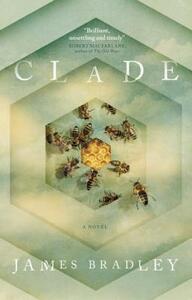Take a photo of a barcode or cover
4.5 Sparse prose and a subtle yet terrifying decline of the world kept me fully immersed even though I had to read this book in small bursts due to a busy schedule.
This book had no plot. Each chapter was set around 10 to 15 years after the previous chapter, which made it hard to get to know any of the characters. Just when I started to care about a character, the chapter would end and we'd skip to the future and see things from a different character's point of view. Normally I would hate this, but it worked ok in this book. Maybe because really the main character of this book is the Earth and the environment. It's all about how climate change will affect humanity and the world. Such topics as infertility, autism, species die-offs, changing weather patterns and the search for extraterrestrial intelligence were introduced--I just wish the ideas had been explored more fully. Contrary to what the cover and the chapter title artwork would have you believe, this book is not about bees. Bees play a minor role in one chapter. Also, the word "Clade" is never mentioned in the book, which seems odd considering it's a word that most people (including me) probably need defined.
A meandering tale that follows one bloodline though our near future and beyond as society slowly begins to collapse and mutate due to climate change and assorted related disasters. I liked the Australian viewpoint, and it was something I could read start-to-finish during a midnight wake up.
Clade is quite a unique book; Bradley takes a completely plausible approach to climate change without blowing it up to some intense, apocalyptic story. The story starts around present day and moves through a series of stories where we see the impacts of climate change through the eyes of three generations of the Leith family.
I thought that this was a very interesting approach, but I must admit that I was not compelled to devour this story because of the way it hops into the future with each story. You never know how far it’s going to hop or who the story is about until you dive in. At times it left me confused about the relationships of the characters which made it hard to connect with them or care too much about them. Part of me liked that it was a bit of a puzzle and there was a lot of mystery about the happenings between stories and the other part of me kind of hated it. I felt like there was constantly something missing that I needed for this to feel like a cohesive narrative.
Despite some of my frustrations, I still thought this was a pretty good piece of climate change fiction. I loved that despite the complete deterioration of our planet, there remains a glimmer of hope all the way through. As I mentioned before I appreciate that it wasn’t an over dramatic, apocalyptic take on the subject. It’s quiet subtlety is what makes it all the more unsettling.
I thought that this was a very interesting approach, but I must admit that I was not compelled to devour this story because of the way it hops into the future with each story. You never know how far it’s going to hop or who the story is about until you dive in. At times it left me confused about the relationships of the characters which made it hard to connect with them or care too much about them. Part of me liked that it was a bit of a puzzle and there was a lot of mystery about the happenings between stories and the other part of me kind of hated it. I felt like there was constantly something missing that I needed for this to feel like a cohesive narrative.
Despite some of my frustrations, I still thought this was a pretty good piece of climate change fiction. I loved that despite the complete deterioration of our planet, there remains a glimmer of hope all the way through. As I mentioned before I appreciate that it wasn’t an over dramatic, apocalyptic take on the subject. It’s quiet subtlety is what makes it all the more unsettling.
This is a terrifyingly plausible portrait of our imminent climate dystopia - Bradley uses beautifully crafted characters to illustrate the gradual unfolding of catastrophic climate change. It's artfully done - not dwelling on the spectacular horrors, but letting them emerge from the lives of a web of interconnected characters. The decades ahead are going to be tough you guys.
This book was intense. It is broken into sections about different people existing in a world some time in the future when climate change is wreaking even more havoc than it is now. The ice is melting, the tectonic plates are shifting and cracking, the rainforests are burning, entire countries are flooded and destroyed, there is a pandemic (that one hits a little close to home right now), etc. You know how people say we need to change our emissions and such because otherwise our future generations won't have a healthy earth? This book shows the reality where that hasn't happened and the earth is rapidly dying. The book takes place over two generations and shows how people continue to live and survive despite the crumbling world around them. The story starts with Adam, a scientist working in Antarctica where it is melting, and ends with one of his descendants on a decimated beach. Everything in between is interesting and heartbreaking and captivating but also unsettlingly real, at least in its potential. I read it all in one day but could definitely see that it would be too intense for others to do so or to read at all.
challenging
reflective
tense
slow-paced
Strong character development:
Yes
Loveable characters:
Complicated
Diverse cast of characters:
No
Flaws of characters a main focus:
Yes
Ambitious in scale yet remarkably realistic and cohesive, given the subject matter.








